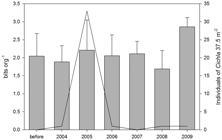Abstract
This study aimed to understand how the introduction of Cichla kelberi in Rosana Reservoir (Paranapanema River) affected the native ichthyofauna. Data on the structure of the small fish fauna assemblage were obtained before and after the introduction of this carnivorous species. Samplings were carried out in February and September of 2004, previously to the register of Cichla kelberi in the reservoir, and after its introduction, November of 2004, January, March, May and August of 2005, February and June of 2006, February and July of 2007, February and October of 2008 and February of 2009. A total of 4,693 fish, belonging to 43 different species was sampled between 2004 and 2009. The order Characiformes was the most abundant, followed by Perciformes and Siluriformes. Comparative analyses, before and after the introduction, could not demonstrate significant changes in composition, richness, abundance, biomass, mean length and diversity of fish. Aquatic insects were the main feeding item of C. kelberi, followed by tetragonopterinae fish. Cannibalism was recorded during the whole study period. The results showed that Cichla cannot deeply affect the ichthyofauna assemblages of a large Neotropical reservoir, at least in a short or medium term period after its introduction. The results also allowed concluding that the introduction of C. kelberi in the reservoir is in the phase 3. In this phase, the specie can survive and reproduce in the new environment; however it is not totally established and disseminated. The reasons for the fact that Cichla is still not dominant in Rosana Reservoir could be related to feeding competition, high rate of cannibalism and the presence of large amount of aquatic macrophytes (refuge zones). In spite of the results, the continuous monitoring of the role of non-native species on the local fish fauna is absolutely necessary because the impacts caused by colonization of this undesirable species can be magnified by complex processes, usually correlated with other environmental disturb, especially the negative effects of damming.
Keywords:
Paranapanema River; Rosana reservoir; non-native fish; biodiversity; ecological impact

 Thumbnail
Thumbnail
 Thumbnail
Thumbnail
 Thumbnail
Thumbnail
 Thumbnail
Thumbnail
 Thumbnail
Thumbnail
 Thumbnail
Thumbnail





